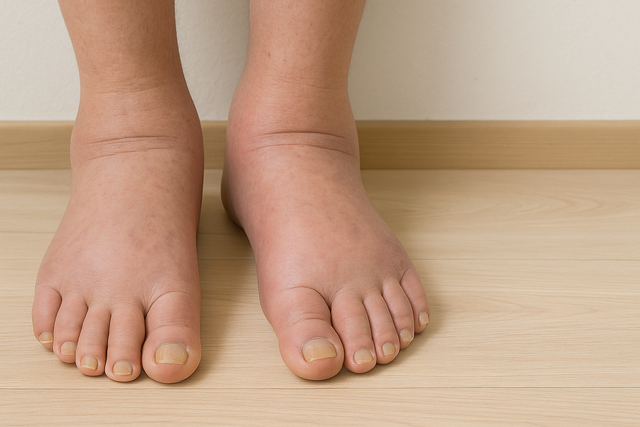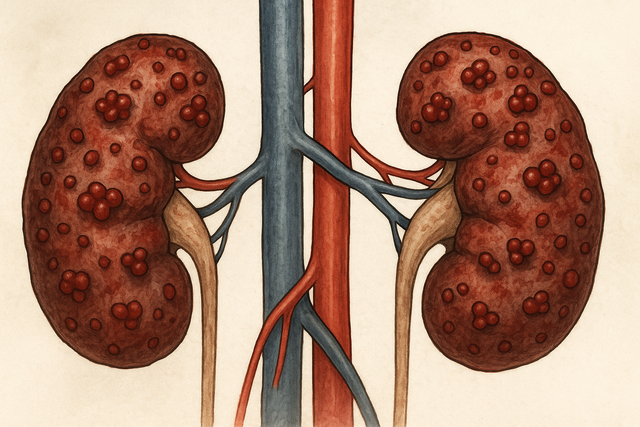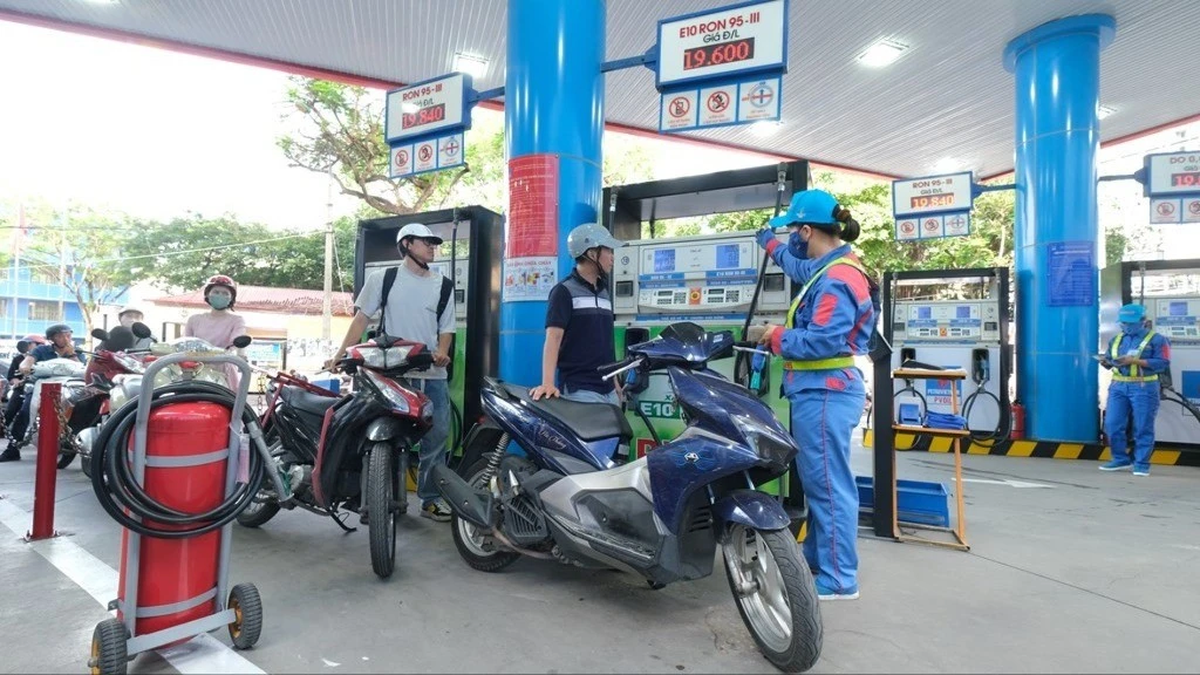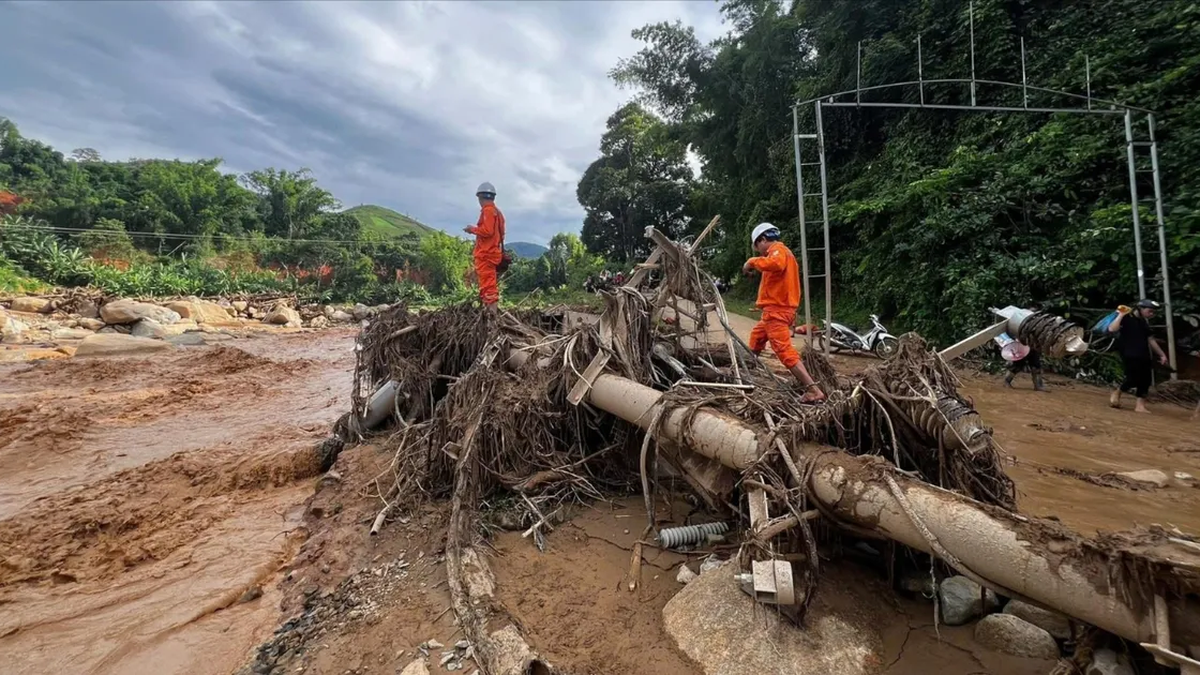According to Dr. Ngo Thi Kim Oanh, University of Medicine and Pharmacy Hospital, Ho Chi Minh City - Facility 3, kidney failure progresses through 5 stages, each stage reflects the level of decline in blood filtration function - assessed through the glomerular filtration rate (GFR).
Phase 1
At this stage, the GFR index is ≥ 90 ml/min/1.73m², the kidneys show signs of damage but the filtration function is still within normal limits. Symptoms are often unclear, the patient may feel completely healthy.
According to doctors, patients in stage 1 need to control underlying diseases well (blood pressure, blood sugar); monitor creatinine and urine levels regularly; maintain a healthy lifestyle: eat a low-salt diet, drink enough water and avoid drugs that are harmful to the kidneys (NSAIDs).
Swollen feet are one of the notable symptoms of kidney failure - ILLUSTRATION PHOTO: AI
Phase 2
GFR index from 60-89 ml/min/1.73m², kidney function begins to decline slightly, but is still sufficient to perform most physiological functions.
Some initial symptoms are mild fatigue, nocturia, and high blood pressure. Therefore, patients need to pay attention to adjusting their diet (reducing protein if indicated); have regular check-ups every 3-6 months, and avoid using kidney-toxic drugs if not absolutely necessary.
Phase 3
GFR index from 30-59 ml/min/1.73m². Doctor Kim Oanh said, this stage 3 is divided into 3a (GFR 45-59) and 3b (GFR 30-44).
Symptoms include: Prolonged fatigue, mild anemia, dull skin, and easy cramps. Notably, the patient may begin to have complications such as high blood pressure, electrolyte disorders, and bone and joint disorders.
“Patients with stage 3 chronic kidney disease need to start treatment with a specialist to increase control of blood pressure and blood sugar; reduce the amount of protein in their diet according to nutritional instructions and closely monitor creatinine, urea, and electrolyte levels,” said Dr. Kim Oanh.
Phase 4
GFR index from 15-29 ml/min/1.73m². At this point, kidney function has decreased significantly, need to prepare for renal replacement therapy.
Severe anemia, itching, anorexia, nausea, edema, resistant hypertension, and calcium-phosphate disorders are symptoms of stage 4 chronic kidney disease.
Patients need to be closely monitored to be ready for dialysis or a kidney transplant when needed. Some alternative forms of treatment that doctors may advise are hemodialysis, peritoneal dialysis or a kidney transplant.
Dialysis helps filter out waste and toxins when the kidneys are no longer able to perform this role - PHOTO: AI
Stage 5 (end-stage renal failure)
GFR <15 ml/min/1.73m², the kidney almost completely loses its blood filtering function; therefore, the patient must receive replacement treatment to maintain life.
When entering this stage, the patient often has severe fatigue, severe nausea, vomiting, generalized edema, oliguria, anorexia, itching, and coma due to increased blood urea.
“End-stage chronic kidney disease patients need to undergo dialysis three times a week, or continuous peritoneal dialysis at home, and if eligible, a kidney transplant. Some psychological support, nutrition, and control of accompanying complications are also carried out during the treatment process,” said Dr. Kim Oanh.
Why do we need dialysis in the final stage?
Dr. Kim Oanh said that dialysis is a method of filtering out waste products, toxins and excess water in the blood when the kidneys are no longer able to perform this role, especially in the final stages. Without dialysis, the patient may die from uremia poisoning, pulmonary edema, acidosis and other dangerous complications.
Discussing the importance of kidney health care, Dr. Kim Oanh emphasized: “Chronic kidney disease is an irreversible process, but it is completely possible to control and slow down the progression if detected early and treatment is followed. Regular monitoring of kidney function, especially in high-risk people (diabetes, hypertension, the elderly, family history) is a key factor in protecting long-term health. Regular check-ups are the best way to protect health, helping to detect dangerous medical conditions early, including chronic kidney disease.”
Source: https://thanhnien.vn/suy-than-bac-si-chi-ra-tung-giai-doan-va-mot-so-trieu-chung-am-tham-185250610061451134.htm



































































































Comment (0)